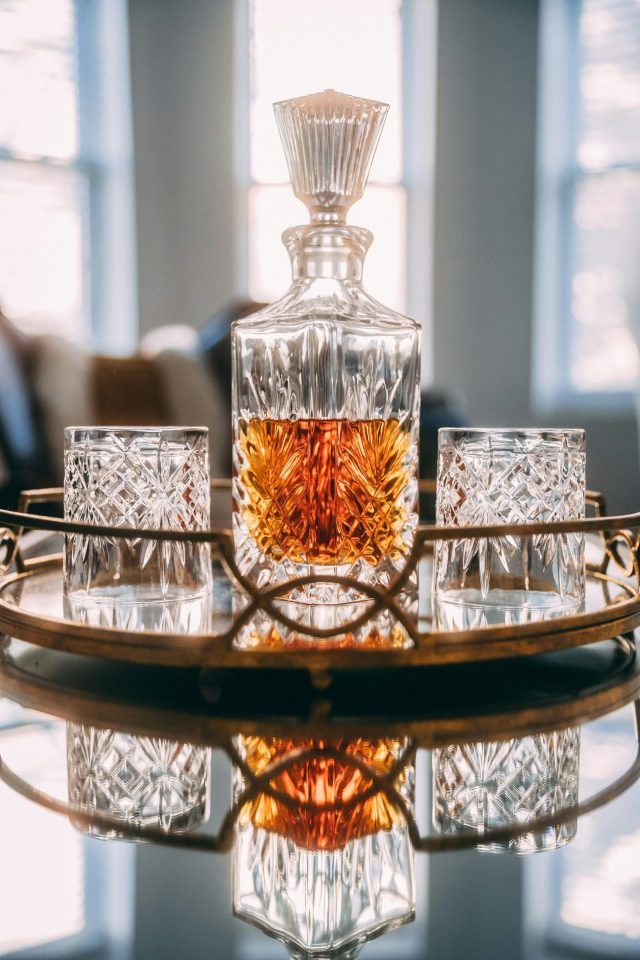
Welcome
Create your free Unicorn account to bid in our legendary weekly auctions.
By continuing, you agree to the Unicorn Terms of Use, Privacy Policy, Conditions of Sale, and to receive marketing and transactional SMS messages.
Already have an account?

Let’s get you approved to bid
To place your first bid, you’ll need to get approved to bid by confirming your mailing address and adding a payment method
Get Your Whiskey Out of That Decanter
Why what’s good for the grape isn’t good for the grain.
Susannah Skiver Barton · Feb 01, 2024

Decanters. We’ve all got one. There it is: the cut-glass globe or slender crystal vessel sparkling on the sideboard. Maybe it was a wedding gift, or part of an inheritance from your great-aunt Kathy. Perhaps a set of matching rocks glasses or tumblers neatly flank its elegant form. The decanter represents stylish home entertaining, a sophisticate’s preferred way of presenting and pouring whiskey rather than slinging it, barbarian-like, from the bottle.
But. Unfortunately. Your decanter sucks.
Decanters, you see, are absolutely terrible for whiskey. Despite being cast as an elegant storage solution that every classy drinker must display proudly on the bar, decanters actually damage their contents, turning a vibrant and delicious spirit into a dull, flat mess. You can, and will, ruin good whiskey by putting it in a decanter.
Why? Decanters, gorgeous though they are, give whiskey’s two worst enemies free access to the liquid inside. Most decanters are made of clear glass, allowing light to penetrate and wreak havoc on the complex compounds that make up whiskey’s aroma and flavor. They’re also far from airtight, and let in oxygen through their shapely glass stoppers, which can also degrade flavors.
Worst of all, if you use the wrong kind of decanter—one made of leaded crystal—it could actually leach poison into your whiskey. Death by decanter seems a rather silly way to go.
But what about wine? Is one not supposed to decant that? Yes! Decanting is often appropriate for wine, like when a cork has crumbled or a young or particularly tight wine needs to be oxygenated. (Though NWR’s Christy Canterbury MW says that, these days, she prefers to use a WinePrO2, which allows more control over how much oxygen is added.)
Whiskey doesn’t work that way. Though sturdier than wine thanks to its higher alcohol content, whiskey still breaks down over time when exposed to light and air. That’s why serious drinkers often seal open bottles with Parafilm or even fill the headspace with an inert gas like argon—which wine drinkers do as well, using tools like the Coravin.
Decanting whiskey is a purely aesthetic practice. There’s no practical reason for it, at least not these days. Once upon a time, when whiskey was sold in barrels, individual consumers would bring a crock or container to a shop to purchase their portion. Those with the means could then store it in a decanter at home. But once glass bottles became widespread, any actual need for decanters disappeared.
When bourbon was on the downswing in the 1960s and 70s, many distilleries released novelty decanters to try and offload excess stock. These elaborate renderings of animals, trains, cars, boats, college sports logos, Egyptian funerary masks, and so on have become popular collector’s items in recent years, as “dusty hunters” snap them up in the hopes that the whiskey within is still in good shape. Sometimes it is. But often it’s undrinkable, because those imperfect stoppers let in a lot of air.
(They still make great display pieces though. What tasteful home is complete without a 15-inch Vegas-era Elvis decanter that plays “Love Me Tender”?)
There is, however, one scenario when decanting whiskey is fine: when you plan to drink it quickly. Maybe you want to spiff things up for a dinner party, or a visit from a prospective father-in-law. In those cases, go ahead and pour a little bourbon or scotch into the decanter, estimating the amount you’re likely to drink that evening. If you overestimate, be sure to finish the whiskey within a day or two.
Considering how beautiful many whiskey bottles are these days, the decanter feels like more of an anachronism than ever. Is it still lovely? It is. But it’d be just as useful as a vessel for iced tea—which, incidentally, looks identical to whiskey, and for some people, could mean their decanter would receive a lot more use. Regardless, whatever you decide to do with that attractive decanter, just remember this: Don’t keep your whiskey in it.

extendedBiddingModal.title
extendedBiddingModal.subtitle
extendedBiddingModal.paragraph1
extendedBiddingModal.paragraph2